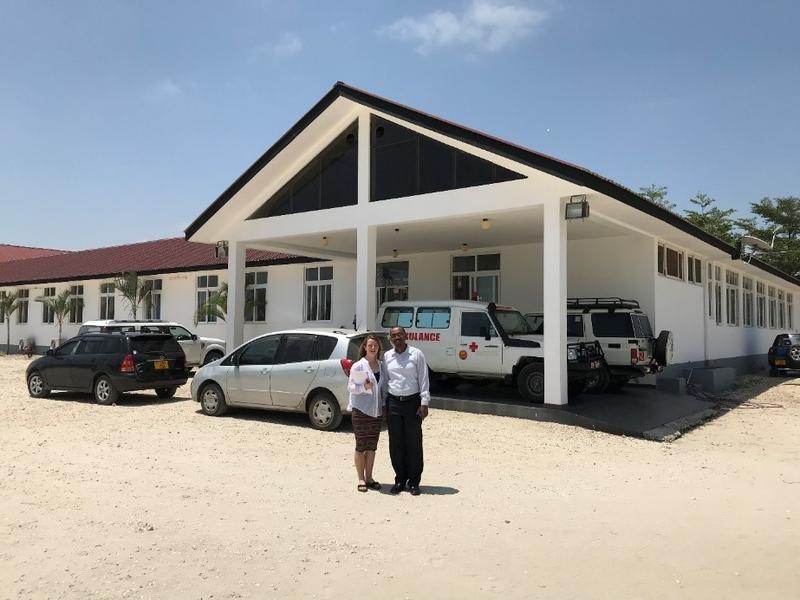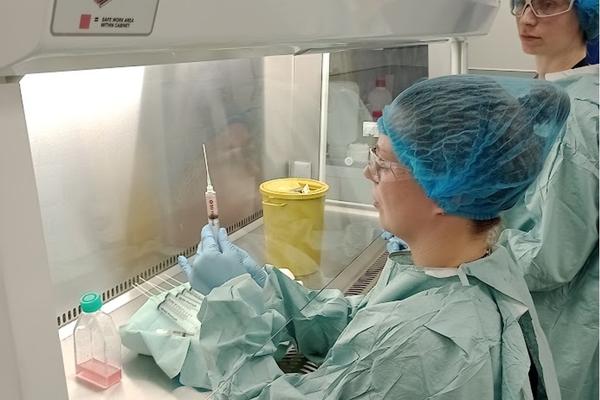Clinical trials
Clinical trials
The Draper group has an active clinical pipeline for Plasmodium falciparum and Plasmodium vivax blood-stage malaria vaccine candidates. For both pathogens, this includes use of a blood-stage controlled human malaria infection (CHMI) model to test protective efficacy (1, 2). The group’s clinical trials team is led by Prof Angela Minassian based at the CCVTM in Oxford.
Plasmodium falciparum - UK
The current leading candidate antigen for a P. falciparum blood-stage malaria vaccine is the antigen PfRH5. In 2014-2015 the Draper group conducted a first-in-human Phase Ia PfRH5 trial with malaria-naïve adult vaccinees in Oxford using a heterologous viral vector platform, ChAd63-MVA (NCT02181088; (3, 4)). The results demonstrated that vaccination against PfRH5 could induces strain transcending neutralising antibodies capable of inhibiting blood-stage parasite invasion of red blood cells in vitro. However, based on projections from preclinical studies, the magnitude of the antibody response was likely below the level required for protection (5, 6) and therefore a vaccine platform capable of inducing higher concentrations of antibody would be required to be effective. The next PfRH5 UK clinical trial was therefore with a full-length protein (RH5.1) candidate, co-administered with the adjuvant AS01B (NCT02927145; (7-10)). This RH5.1/AS01B trial included a CHMI arm and was the first demonstration of any in vivo effect with a blood-stage malaria vaccine candidate. Importantly, data from this trial also indicated that delayed booster dosing improved serum antibody durability. Further trials are now ongoing in Oxford – and with our collaborator Dr Ruth Payne in Sheffield – to test RH5.1 with Matrix-M adjuvant in different dosing regimens (NCT06141057), in combination with the new R78C blood-stage vaccine candidate (R78C paper; NCT05385471), and with delivery via a virus-like particle (VLP) vaccine platform (NCT05978037).
Plasmodium falciparum - Africa
Alongside the UK clinical trials in malaria-naïve adults, the Draper/Minassian group collaborate closely with Dr Ally Olotu (Ifakara Health Institute, Tanzania), Prof Umberto D’Alessandro (Medical Research Council Unit The Gambia), Prof Halidou Tinto (Clinical Research Unit of Nanoro [IRSS-URCN], Burkina Faso) and their respective teams to evaluate the PfRH5 vaccine candidates in malaria-exposed populations. In 2018-2019, an age de-escalation trial was run with the ChAd63-MVA vaccine platform in a malaria endemic setting in Bagamoyo, Tanzania (NCT03435874; (11)). An age de-escalation RH5.1/Matrix-M trial followed where the highest GIA results to date were observed in children receiving a delayed boosting regimen (trial results article; (NCT04318002; (12, 13)). Building on this work are further ongoing trials in The Gambia (testing the VLP platform in combination with the licensed pre-erythrocytic vaccine R21; NCT05357560) and a Phase 2b efficacy trial in Burkina Faso which recently reported positive efficacy data at the 6-month time point, an exciting milestone for the blood-stage malaria vaccine field (NCT05790889; Natama et al. medRχivand in press at Lancet Infect Dis).

Sarah Silk (Clinical Trials Immunologist) with collaborator Dr Ally Olotu (Head of Interventions & Clinical Trials, Ifakara Health Institute)
Plasmodium vivax - UK
The P. vivax vaccine development programme focuses on region II of the Duffy-binding protein (PvDBP) blood-stage antigen. In 2013-2014 a Phase 1a trial was conducted with PvDBP expressed with the ChAd63-MVA heterologous viral vector platform which induced strain-transcendent antibodies (NCT01816113; (14, 15)). This was followed by a UK Phase 1/2a clinical trial with both the ChAd63-MVA viral vector platform (NCT04009096) and PvDBPII protein (provided by our collaborator Dr Chetan Chtinis) with Matrix-M adjuvant (NCT04201431), which included CHMI arms to test vaccine efficacy. Consistent with our P. falciparum work, data from these P. vivax trials indicated increased immunogenicity and efficacy with delayed booster dosing administration of protein/Matrix-M candidates (13, 16).

Sarah Silk and Carolyn Nielsen during P. vivax inoculum preparation training session
Current clinical, lab, and project management staff
Angela Minassian
Andrew Duncan
Jennifer Van Heerden
Sarah Silk
Carolyn Nielsen
Tom Roberts
Jee-Sun Cho
Rachel Cowan
Rachel Roberts
Cassandra Rigby
Jo Salkeld
Mimi Hou
Fran Donnellan
Kate Skinner
Key publications
1. Payne RO, Milne KH, Elias SC, Edwards NJ, Douglas AD, Brown RE, et al. Demonstration of the Blood-Stage Plasmodium falciparum Controlled Human Malaria Infection Model to Assess Efficacy of the P. falciparum Apical Membrane Antigen 1 Vaccine, FMP2.1/AS01. J Infect Dis. 2016;213(11):1743-51.
2. Duncan CJ, Sheehy SH, Ewer KJ, Douglas AD, Collins KA, Halstead FD, et al. Impact on malaria parasite multiplication rates in infected volunteers of the protein-in-adjuvant vaccine AMA1-C1/Alhydrogel+CPG 7909. PLoS One. 2011;6(7):e22271.
3. Payne RO, Silk SE, Elias SC, Miura K, Diouf A, Galaway F, et al. Human vaccination against RH5 induces neutralizing antimalarial antibodies that inhibit RH5 invasion complex interactions. JCI Insight. 2017;2(21).
4. Alanine DGW, Quinkert D, Kumarasingha R, Mehmood S, Donnellan FR, Minkah NK, et al. Human Antibodies that Slow Erythrocyte Invasion Potentiate Malaria-Neutralizing Antibodies. Cell. 2019;178(1):216-28 e21.
5. Douglas AD, Baldeviano GC, Jin J, Miura K, Diouf A, Zenonos ZA, et al. A defined mechanistic correlate of protection against Plasmodium falciparum malaria in non-human primates. Nat Commun. 2019;10(1):1953.
6. Douglas AD, Baldeviano GC, Lucas CM, Lugo-Roman LA, Crosnier C, Bartholdson SJ, et al. A PfRH5-based vaccine is efficacious against Heterologous strain blood-stage Plasmodium falciparum infection in aotus monkeys. Cell Host Microbe. 2015;17(1):130-9.
7. Jin J, Tarrant RD, Bolam EJ, Angell-Manning P, Soegaard M, Pattinson DJ, et al. Production, quality control, stability, and potency of cGMP-produced Plasmodium falciparum RH5.1 protein vaccine expressed in Drosophila S2 cells. NPJ Vaccines. 2018;3:32.
8. Minassian AM, Silk SE, Barrett JR, Nielsen CM, Miura K, Diouf A, et al. Reduced blood-stage malaria growth and immune correlates in humans following RH5 vaccination. Med (N Y). 2021;2(6):701-19 e19.
9. Nielsen CM, and Ogbe A. Protein/AS01B vaccination elicits stronger, more Th2-skewed antigen-specific human T follicular helper cell responses than heterologous viral vectors. Cell Rep Med. 2021;2:100207.
10. Nielsen CM, Barrett JR, Davis C, Fallon JK, Goh C, Michell AR, et al. Delayed boosting improves human antigen-specific Ig and B cell responses to the RH5.1/AS01B malaria vaccine. JCI Insight. 2023;8(2).
11. Silk SE, Kalinga WF, Mtaka IM, Lilolime NS, Mpina M, Milando F, et al. Superior antibody immunogenicity of a viral-vectored RH5 blood-stage malaria vaccine in Tanzanian infants as compared to adults. Med.2023;4(10):668-86 e7.
12. Silk SE, Kalinga WF, Salkeld J, Mtaka IM, Ahmed S, Milando F, et al. Blood-stage malaria vaccine candidate RH5.1/Matrix-M in healthy Tanzanian adults and children; an open-label, non-randomised, first-in-human, single-centre, phase 1b trial. Lancet Infect Dis. 2024;24(10):1105-17.
13. Barrett JR, Silk SE, Mkindi CG, Kwiatkowska KM, Hou MM, Lias AM, et al. Analyses of human vaccine-specific circulating and bone marrow-resident B cell populations reveal benefit of delayed vaccine booster dosing with blood-stage malaria antigens. Front Immunol. 2023;14:1193079.
14. Payne RO, Silk SE, Elias SC, Milne KH, Rawlinson TA, Llewellyn D, et al. Human vaccination against Plasmodium vivax Duffy-binding protein induces strain-transcending antibodies. JCI Insight. 2017;2(12).
15. Rawlinson TA, Barber NM, Mohring F, Cho JS, Kosaisavee V, Gerard SF, et al. Structural basis for inhibition of Plasmodium vivax invasion by a broadly neutralizing vaccine-induced human antibody. Nat Microbiol.2019;4(9):1497-507.
16. Hou MM, Barrett JR, Themistocleous Y, Rawlinson TA, Diouf A, Martinez FJ, et al. Vaccination with Plasmodium vivax Duffy-binding protein inhibits parasite growth during controlled human malaria infection. Sci Transl Med.2023;15(704):eadf1782.
https://www.youtube-nocookie.com/embed/3eG43sAmhUI?si=BKDdFn-U6KQzpxfr


